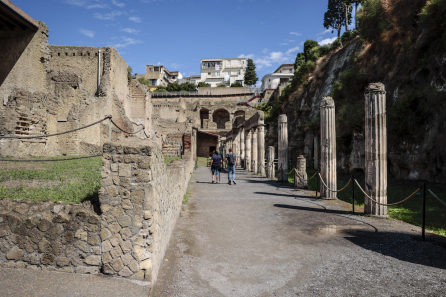Summer School on Sustainable conservation and management of archaeological sites through reducing risks and building resilience at Herculaneum, Italy
Organizers: ICCROM and The University of Pennsylvania Weizman School of Design Department of Historic Preservation, in collaboration with:
- Parco Archeologico di Ercolano
- Fondazione Ente Ville Vesuviane,
- Packard Humanities Institute & Fondazione Istituto Packard per i Beni Culturali
Archaeological sites are irreplaceable cultural assets that need to be protected and managed in relation to their wider setting. Understanding why this is essential—both for preservation and sustainable development—will be a key focus of the Summer School. Effective conservation and management have to address causes that come inside and outside the site.
Furthermore, the heritage significance of the site and the history of its discovery may depend on features in the wider landscape. Importantly, heritage conservation and management can bring benefits to local communities and other stakeholders, who in turn, can contribute valuable support, skills and capacities to ensure the site’s long-term sustainability.
Heritage sites today face growing threats from a wide range of challenges—including urbanization, overtourism, natural disasters, extreme weather events, socio-economic pressures, and even shortcomings in governance and management, with repercussions also for authenticity and integrity. Planning for conservation and management of archaeological sites should consider these risks, while also building on the opportunities through engaging with local communities.
The summer School will centre on Herculaneum, a compelling case study that highlights the importance of viewing archaeological sites as integral to the modern urban town, in this case, Ercolano. This example lends itself to exploring the benefits of a “place-based approach” to sustainable conservation that draws on the linkages between people, nature and culture.
The summer school offers a comprehensive programme aimed at enhancing the capabilities of young professionals in heritage conservation.
The course content covers relevant topics, such as:
- Assessment of heritage values of archaeological sites and their setting
- Integrated risk, vulnerability and capacity assessment of archaeological sites
- Stakeholder mapping
- Place-based approach for heritage management
- People-centred heritage conservation and management
- Mitigation and adaptation solutions informed by risk assessment
- Sustainable conservation interventions
Participants will take part in interactive lectures, engage with various stakeholders and work together in hands-on field exercises in the ancient city of Herculaneum, and in the Municipality of Ercolano as a whole, which stretches from the crater of Vesuvius all the way to the sea. The course emphasizes the importance of interdisciplinary approaches and knowledge exchange in addressing the challenges of conservation and management of archaeological sites.
Application deadline: 9 May 2025
Course dates: 19 June –16 July 2025
Target groups
HSS-2025 is open to 5 young professionals from around the world, who are actively engaged in heritage conservation and management. They will work along with five postgraduate students in heritage conservation at the University of Pennsylvania.
The key selection criteria for participants will include:
- Professionals and representatives of institutions working in heritage conservation and management
- Involvement in activities related to the course topic and experience in the heritage field
- Quality of submitted application forms
- Proficiency in English
Learning Outcomes
The Summer School will equip the participants to gain knowledge and skills for assessing risks, capacities and opportunities; identify key actors and rightsholders; and understand existing conservation measures and management systems. The participants will develop risk mitigation and adaptation solutions and identify ways of integrating them in existing conservation, maintenance and monitoring efforts through effective engagement of local communities and other stakeholders.
Course fee
Free
Travel, Accommodation, and Expenses
The organizers will cover round-trip travel costs for the five international participants from their country of origin to Italy, local transportation in Italy to Herculaneum, accommodation, and meals during the course.
Application Process
Please use the online course application form
In order to finalize your application, the following digital files will be required when completing the online form:
- Portrait photo (allowed formats: pdf doc docx jpg jpeg png tif tiff with a maximum file size of 5 MB)
- Official endorsement (allowed formats: pdf doc docx jpg jpeg png tif tiff with a maximum file size of 5 MB)
- Curriculum Vitae (allowed formats: pdf doc docx with a maximum file size of 5 MB)
- Brief report replying to the following question: Describe a heritage conservation project you have been working on and explain the challenges and opportunities you have encountered in implementing it.
Contact Information
If you encounter any issues with the application or need further information, please don’t hesitate to contact us at: hss2025@iccrom.org


